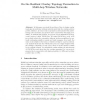Free Online Productivity Tools
i2Speak
i2Symbol
i2OCR
iTex2Img
iWeb2Print
iWeb2Shot
i2Type
iPdf2Split
iPdf2Merge
i2Bopomofo
i2Arabic
i2Style
i2Image
i2PDF
iLatex2Rtf
Sci2ools
123
click to vote
NETWORKING
2007
2007
On the Resilient Overlay Topology Formation in Multi-hop Wireless Networks
In this paper, we study the problem of how to design overlay topologies in multi-hop wireless networks such that the overlays achieve perfect resilience, in terms of all cooperative nodes included but misbehaving nodes excluded, and preserve the k-connectivity with high probability. To address this problem, we propose a new distributed topology control protocol called PROACtive. By using PROACtive, every node pro-actively selects its cooperative adjacent nodes as neighbors by mutually exchanging neighbor request and reply messages. As a result, the union of all neighbor sets forms a resilient overlay for a given network. Our analysis finds that the PROACtive protocol is light-weighted with the message complexity of only O(m), where m is the number of links in the original network. Our simulation results validate the effectiveness of PROACtive and show that the overlays generated by our protocol preserve the k-connectivity with high probability (> 90%) and low false positive ratio ...
Computer Networks | Cooperative Adjacent Nodes | Cooperative Nodes | Multi-hop Wireless Networks | NETWORKING 2007 |
| Added | 30 Oct 2010 |
| Updated | 30 Oct 2010 |
| Type | Conference |
| Year | 2007 |
| Where | NETWORKING |
| Authors | Fei Xing, Wenye Wang |
Comments (0)

